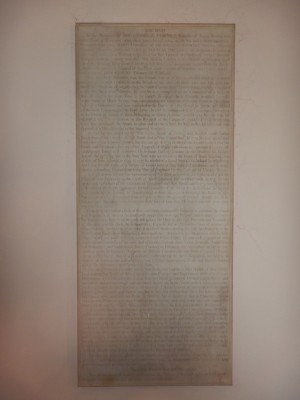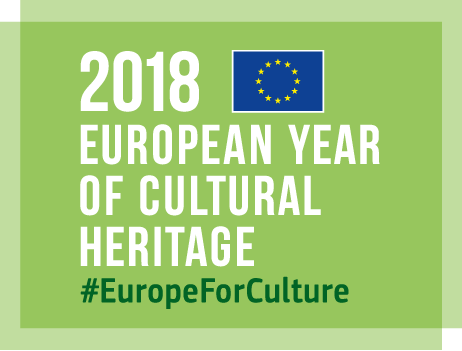LD-SPNF-0271
Sacred
Sir George Forbes 3rd Earl of Granard. Died 1767
To the memory of Sir George Forbes, Knight of Nova Scotia and Third Earl of Granard, who died June the 19th 1765 aged 80 and is here interred. He married in 1709 Mary, daughter of Sir William Stewart, who was created Viscount Mountjoy 1682, and relict of Phineas Preston of Ardsalab, a charitable and pious woman respected for her virtues and beloved for her amiable temper both by young and old. She died in London in the month of October 1758 aged 95 leaving three children, GEORGE, a Lieutenant General in the Army, JOHN, who became Admiral of the Fleet and General of the Marines and Lady Mary, who married JAMES IRVINE Esquire of Scotland.
Sir George Forbes was second son of Arthur, Second Earl of Granard who became Lord Forbes on the death of his older brother who was killed in the Battle of Blenheim in August 1704, he himself in the same month being warmly engaged in the sea fight near Malaga. In 1706, he was advanced to the Command of a ship of war; serving at the same time in the Fourth Troop of Horse Guards in which he rose to the rank of Major. In 1710, then commanding the Garrison of seventy guns at Barcelona, he went a Volunteer and was wounded in the Battle of Villa Viciosit in Spain, and served at the next Campaign in the same Army. In 1718, he commanded as Lieutenant General in the island of Minorca then belonging to Great Britain, and in 1719, he was sent by George the first to Vienna, at the request of the Emperor, Charles the sixth, who knew him personally in Spain, to plan and create a navy for him in the Adriatic, and was appointed a Vice Admiral in the Imperial Service.
In 1727, he was called up by Writ of the House of Peers, and in 1728 made custodian Rotuiorum of the County of Westmeath and a Privy Councillor. In 1729 he was appointed Governor of the Leeward Islands, but did not go. In 1733, George, the second, named him his Envoy and Plenipotentiary to ANNE, Empress of Russia, with whom he concluded a very advantageous Treaty of Commerce. He became Earl of Granard by the death of his Father on August the 24th 1734; and in the same year was advanced to the Rank of Rear Admiral and to that of Vice Admiral in 1735. In 1737, he rendered a signal Service to Ireland by regulating and fixing the just value of a Variety of Gold Coins at that time in circulation and in negotiating a standing contract with the Mint of England for the coinage of copper money.
In 1738, he was offered the Government of New York and with it the command of all the Ships of War stationed in the Coast of North America but declined both.
In 1739, he was appointed Governor of the Counties of Longford and Westmeath and in 1741 was returned member of the British Parliament for the Boroughs of Air Irvine and Co in Scotland as he had been before in 1727 for that of Queensborough in Kent. In 1742 he resigned his Rank in the Navy and in 1744 he retired from a Public Life to the greatest Privacy though not to indolence and inactivity for it may be truly said of him that ‘He never was less alone; than when he was alone’.
Born with the Faculties of Body and Mind which qualify Mankind to promote the Good and happiness of Society, he constantly applied them to the Purpose; and in order to render his Talents more beneficial, he early disciplined his Mind, by the best Precepts and Examples of Morality; and his Body by Temperence, Exercise and an Abstinence from all manner of iperiliunities. Nor did he ever relax from these Habits during his Life.
Indefatigable in the search after knowledge, his Pursuits were uniformly directed to the Attainment of it in those things which are most essentially connected with Public Utility. He was well acquainted with the State and interests of his own and foreign Nations, their Views, Strengths, Productions, and Resources; and understood Trade, Commerce, Finances and Agriculture as far as they conduce to the Welfare and Prosperity of different countries. He also studied Natural History as a Philosopher; but as a Statesman contemplating the three Kingdoms; not merely as objects of Science but with a view to their Life and Importance in Trade and Manufactures, Sustenance and Service of Man.
He was a Seaman; Soldier and Statesman and had been tried in each of those Professions uniting the Study of their Principles with Practice and Experience, affiliated by different Observations, and Difernment and a clear and sound judgement. He had - a high spirit and an ardent and enterprising Courage which urged him in his Youth seek Glory by every becoming Means and to follow her at all hazards. Lifed to Courts he had acquired the good Breeding the Courtly and Address peculiar to them but without their Vices. His Education and his Fortune were solely his own work, for from the Age Fifteen he had no Protection except what his own Prudence and good Conduct procured him and which made him early noticed by Queen ANNE and successively distinguished by George the first and George the second.
As he possessed an extensive and general knowledge, he suited his conversation to full Ranks and conditions young and old, Men of Service, Mechanics and Husbandman was always singular entertaining and instructive. He reasoned profoundly and trifled agreeably to a lively imagination and just Memory he united a fine Vein of “Raillery” and polite and engaging Gallantry, which enabled him on all subjects to discourse pleasantly and apply happily.
He bore his Talents with great Modesty and never valued himself highly, except when he was called upon by Honor to do so. At the same time he admired Merit in others and always encouraged it by his Councel, his Protection and his Liberalities.
He revered the Religion as he did the Constitution of his Country, judging them both to be the most pure and wise of any and best calculated to secure and advance the Happiness of Mankind.
His Son, the Admiral inscribed this Marble to record the Merits of his Past and his own Pride and Felicity in being descended from them. His Admiration of his father made them strive through life to follow so excellent a Guide but
SEQUITUR PATREM NON PASSIBUS AEQUIS
May others succeed better and transmit his Virtues, with his Honors to their latest Posterity; esteeming the first valuable inheritance.



